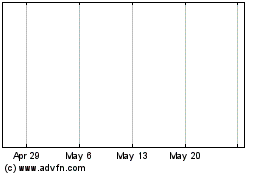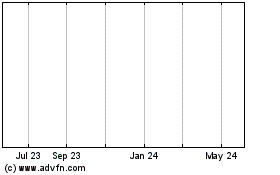Cortex's AMPAKINE Compound, CX717, Achieves Primary Endpoints in Second Phase IIa Respiratory Depression Study in Germany
October 06 2008 - 7:31AM
Business Wire
Cortex Pharmaceuticals, Inc. (NYSE Alternext US (COR)) reported
that top-line data from its second Phase IIa study in
opioid-induced respiratory depression (RD) demonstrated that a
single oral dose of 1500mg of the AMPAKINE� compound CX717 achieved
statistical significance (p = 0.005) over placebo on the primary
endpoint measure of spontaneous basal respiration without affecting
opioid-induced analgesia. This placebo-controlled, double-blind,
randomized two-way crossover trial (CX717-RD-01) was performed by
one of the leading experts in the field, Professor J�rn L�tsch at
the Institut f�r Klinische Pharmakologie, Johann Wolfgang
Goethe-Universit�t in Frankfurt, Germany. In this study, sixteen
volunteers each received either 1500mg of CX717 or matching placebo
that was orally administered two hours before each subject received
an intravenous infusion of the opioid, alfentanil. The primary
performance measures were the basal breathing rate, and the minute
expiratory volume (VE) at 55 mmHg CO2 (VE55), and the lack of
effect on analgesia. CX717 prevented the reduction in basal
breathing rate induced by alfentanil, in comparison to placebo (p =
0.005). The degree of the reversal of the basal respiratory rate
was similar to that obtained with the opioid antagonist, naloxone
(Narcan�). At the same time, the analgesic properties of alfentanil
were maintained in an acute pain model in the presence of CX717,
whereas naloxone blocked the analgesic properties. The effect of
CX717 on the VE55 numerically trended toward reversing, but did not
reach statistical significance. In August 2008, Cortex reported
that in its first Phase IIa study in opioid-induced RD, 2100mg
CX717 significantly reversed the VE55 measure of respiration.
Spontaneous basal respiration was not an endpoint in the first
Phase IIa study. �The primary objective of these two studies was to
verify that this novel mechanism of action observed in animals
would translate to humans,� commented Mark A. Varney, President and
CEO, �and we are pleased to see statistically significant effects
with a single oral dose in these small proof of concept clinical
studies.� Dr. Varney went on to say, �AMPAKINE compounds may
positively impact the ability of caregivers to optimize pain
management for patients, as well as provide Cortex with a
potentially large partnering opportunity and a good revenue stream
when commercialized.� The incidence of RD in a clinical setting
related to opioid administration has been estimated to be up to 17%
when oxygen desaturation is used as the indicator. Professor L�tsch
added, �There are still fatal outcomes after opioid administration
even under controlled conditions in the clinical setting. The data
from this study supports the possibility of using CX717 in the
clinic to avoid life-threatening adverse effects associated with
opioids.� These human results replicate data from animal studies
generated by Dr. John Greer at the University of Alberta, which
showed the utility of CX717 and other AMPAKINE compounds to prevent
and treat opioid-induced RD without affecting their analgesic
properties. Dr. Greer stated, �These advances will help patients
whose pain cannot be treated effectively with opioids due to the
unwanted side effect of a depression of breathing. Administration
of AMPAKINE compounds can overcome this problem and lead to a
significant improvement in pain management, as well as guard
against deaths caused by opioid overdose. We are now extending our
preclinical studies to determine whether AMPAKINE molecules can
help the breathing problems in prematurely born babies and in
adults with sleep apnea. This has been, and continues to be, an
extremely productive collaboration with Cortex that is resulting in
the translation of our basic scientific discoveries to clinical
applications.� Cortex plans to continue the development of AMPAKINE
compounds in opioid-induced RD. An intravenous dosage form of CX717
is being finalized, and a follow-on compound, CX1942, a water
soluble pro-drug of a novel AMPAKINE compound with improved potency
over CX717, will shortly enter preclinical development for RD.
Additionally, a novel AMPAKINE molecule, CX1739, is currently in
Phase I clinical trials and is targeted to begin Phase II clinical
trials for ADHD in Q2 2009. Cortex Pharmaceuticals, Inc. Cortex,
located in Irvine, California, is a neuroscience company focused on
novel drug therapies for treating psychiatric disorders,
neurological diseases and brain mediated breathing disorders.
Cortex is pioneering a class of proprietary pharmaceuticals called
AMPAKINE compounds, which act to increase the strength of signals
at connections between brain cells. The loss of these connections
is thought to be responsible for memory and behavior problems in
Alzheimer�s disease. Many psychiatric diseases, including
schizophrenia, occur as a result of imbalances in the brain�s
neurotransmitter system. These imbalances may be improved by using
the AMPAKINE technology. Cortex has an alliance with
Schering-Plough Corporation who acquired Cortex�s former partner
N.V. Organon in November 2007. As a result of this acquisition,
Schering-Plough has two AMPAKINE Phase II compounds Org24448 and
Org 26576 for the treatment of schizophrenia and depression. In
December 2006 Cortex terminated the research collaboration with
Servier enabling Cortex to pursue the use of AMPAKINE compounds in
the treatment of neurodegenerative diseases on a global basis.
Servier retained the right to select up to three compounds
developed during the collaboration for further development for the
treatment of neurodegenerative diseases. Cortex may receive
additional milestones and royalties if either Organon or Servier is
successful in developing and commercializing AMPAKINE compounds.
For additional information regarding Cortex, please visit Cortex
Pharmaceuticals� website at http://www.cortexpharm.com.
Forward-Looking Statement Note - This press release contains
forward-looking statements concerning the Company�s research and
development activities. The success of such activities depends on a
number of factors, including the risks that the Company�s proposed
compounds may at any time be found to be unsafe or ineffective for
the indications under pre-clinical or clinical tests and that such
studies may at any point be suspended or take substantially longer
than anticipated to complete. The forward-looking statements are
necessarily subject to risks and uncertainties, all of which are
difficult or impossible to predict accurately and many of which are
beyond the control of Cortex, all as more fully described in the
risk factors and other matters set forth in Cortex�s Annual Report
on Form 10-K for the year ended December 31, 2007, and Cortex�s
other filings with the Securities and Exchange Commission, As
discussed in the Company�s Securities and Exchange Commission
filings, the Company�s proposed products will require additional
research, lengthy and costly clinical testing and regulatory
approval. AMPAKINE compounds are investigational drugs and have not
been approved for the treatment of any disease. Cortex disclaims
any intent or obligation to update any forward-looking statements.
Cortex Pharm (AMEX:COR)
Historical Stock Chart
From Dec 2024 to Jan 2025

Cortex Pharm (AMEX:COR)
Historical Stock Chart
From Jan 2024 to Jan 2025
